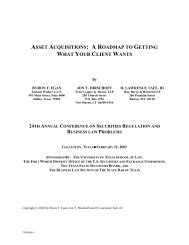fiduciary duty issues in m&a transactions - Jackson Walker LLP
fiduciary duty issues in m&a transactions - Jackson Walker LLP
fiduciary duty issues in m&a transactions - Jackson Walker LLP
Create successful ePaper yourself
Turn your PDF publications into a flip-book with our unique Google optimized e-Paper software.
with the notable exception of the claim aga<strong>in</strong>st the Company’s directors alleg<strong>in</strong>g Caremarkviolations.In 1998, HBOC’s audit committee met with HBOC’s outside auditor to discuss HBOC’s1997 audit and was <strong>in</strong>formed that the 1997 audit was “high risk” and expla<strong>in</strong>ed its concerns.Although a subsequent SEC <strong>in</strong>vestigation established that HBOC was misapply<strong>in</strong>g the generallyaccepted account<strong>in</strong>g pr<strong>in</strong>ciples for f<strong>in</strong>ancial report<strong>in</strong>g <strong>in</strong> the U.S. (“GAAP”), the auditors did not<strong>in</strong>form the audit committee of this fact, and reported that there were no significant problems orexceptions and that the auditors enjoyed the full cooperation of HBOC management.Dur<strong>in</strong>g the summer of 1998, HBOC held discussions with McKesson regard<strong>in</strong>g apotential merger. McKesson engaged <strong>in</strong>dependent accountants and <strong>in</strong>vestment bankers to assistit <strong>in</strong> evaluat<strong>in</strong>g the proposed merger. In a meet<strong>in</strong>g with these advisors, McKesson’s board ofdirectors discussed the proposed merger and the due diligence <strong>issues</strong> that had surfaced, and firstlearned of HBOC’s questionable account<strong>in</strong>g practices, although there was no <strong>in</strong>dication that theMcKesson board actually knew of any of HBOC’s material account<strong>in</strong>g violations.In October 1998, after a brief suspension of merger negotiations, the parties resumeddiscussions and agreed upon a modified deal structure, but they did not resolve the <strong>issues</strong> relatedto HBOC’s account<strong>in</strong>g practices. On October 16, 1998, with awareness of some of HBOC’saccount<strong>in</strong>g irregularities, McKesson’s board approved the merger and agreed to acquire HBOCfor $14 billion <strong>in</strong> McKesson stock. Follow<strong>in</strong>g the effective time of the merger, theHBOC/McKesson Survivor’s audit committee met with its advisors to discuss the transactionand certa<strong>in</strong> account<strong>in</strong>g adjustments to HBOC’s f<strong>in</strong>ancial statements, which the audit committeeknew were <strong>in</strong>sufficient to remedy the account<strong>in</strong>g improprieties that its auditors had previouslyidentified. The HBOC/McKesson Survivor took some remedial action <strong>in</strong> April 1999, when itannounced that it would restate its prior earn<strong>in</strong>gs downward and, a few months later, term<strong>in</strong>atedthe senior management responsible for the account<strong>in</strong>g improprieties.Thereafter, the pla<strong>in</strong>tiffs brought a <strong>duty</strong> of oversight claim aga<strong>in</strong>st the directors of theHBOC/McKesson Survivor alleg<strong>in</strong>g, <strong>in</strong>ter alia, that the Company directors had failed to (1)correct HBOC’s false f<strong>in</strong>ancial statements, (2) monitor the account<strong>in</strong>g practices of the Company,(3) implement sufficient <strong>in</strong>ternal controls to guard aga<strong>in</strong>st wrongful account<strong>in</strong>g practices thatwere uncovered follow<strong>in</strong>g the merger, and (4) disclose HBOC’s false f<strong>in</strong>ancial statements. TheCourt noted that under Caremark “a derivative pla<strong>in</strong>tiff must allege facts constitut<strong>in</strong>g ‘asusta<strong>in</strong>ed or systematic failure of the board to exercise oversight – such as an utter failure toattempt to assure a reasonable <strong>in</strong>formation report<strong>in</strong>g system exists.’” To survive a motion todismiss, the pla<strong>in</strong>tiff was required to show that the HBOC/McKesson Survivor board shouldhave known that the alleged account<strong>in</strong>g problems had occurred or were occurr<strong>in</strong>g and made nogood faith effort to rectify the account<strong>in</strong>g improprieties. Not<strong>in</strong>g that the pla<strong>in</strong>tiff was entitled tothe benefit of all reasonable <strong>in</strong>ferences drawn from the applicable facts, the Court found that thepla<strong>in</strong>tiffs had alleged sufficient facts to <strong>in</strong>fer that the boards of each of McKesson and HBOC –members of which comprised the board of the HBOC/McKesson Survivor – knew, or shouldhave known, of HBOC’s account<strong>in</strong>g irregularities, not<strong>in</strong>g that (i) HBOC’s audit committeebecame aware of the account<strong>in</strong>g problems when it learned that its 1997 audit was “high risk” andthat the McKesson board learned of some of the problems dur<strong>in</strong>g the July 1998 board meet<strong>in</strong>g atwhich due diligence <strong>issues</strong> were discussed, and (ii) the HBOC/McKesson Survivor’s audit5446095v.118
















